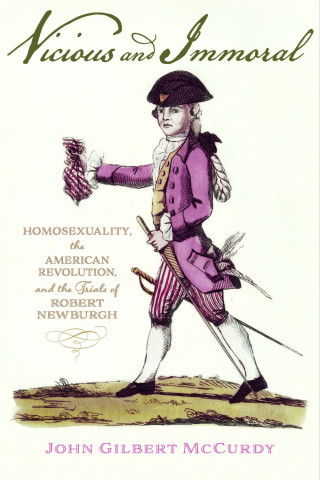Vicious and Immoral: Homosexuality, the American Revolution, and the Trials of Robert Newburgh
- By John Gilbert McCurdy
- Johns Hopkins University Press
- 376 pp.
- Reviewed by James A. Percoco
- July 10, 2024
How an 18th-century buggery charge dovetailed with the fight for freedom.

“On August 8, 1774, two dozen British officers and soldiers gathered in New York City to judge the Reverend Robert Newburgh. Newburgh was chaplain to the Eighteenth Regiment of Foot, also known as the Royal Irish, and he faced a general court-martial for ‘Vicious and Immorral Behaviour.’” So begins the prologue of John Gilbert McCurdy’s Vicious and Immoral, in which the author brings to life a little-known episode from the American Revolution.
Throughout the book, McCurdy, both a scholar of early American and LGBTQ+ history and a gay man, examines the issue of homosexuality within the larger tale of the war that birthed the United States. His prose is lucid, accessible, and compelling as he relates to readers the series of indignities endured by Captain Newburgh. Ultimately, it’s a history, biography, courtroom drama, and exploration of life among the Redcoats all rolled into one.
Newburgh, like many persecuted people, was targeted as much for challenging authority (in this case, by dressing flamboyantly and defying the brass) as for the supposed immoral acts he committed. In a brilliant and well-argued thesis, McCurdy presents Newburgh’s repeated pleas of innocence — not against the charges of homosexuality (he was almost certainly queer) but against the notion that his personal life should impact his professional one — through the lens of nascent Enlightenment thinking.
In 1774, the captain was formally charged with buggery based on a rumor stemming from his time serving in Ireland years before he was stationed in the Colonies. By the end of his multiple trials in multiple locations, Newburgh had endured endless character assassination that would do more damage to his career and reputation than the infraction of “vicious and immorral” behavior ever could.
The allegations against Newburgh were partly rooted in the fact that he often encouraged fellow soldiers — in his capacity as clergy — to stand up to superiors when they were mistreated. Naturally, this did not sit well with those superiors, who sought to oust Newburgh from the service. It was because so many of the men he’d counseled spoke in his defense that the higher-ups decided to resurrect the old charges from Ireland (the witnesses for which were not on hand) and throw those at the chaplain.
The larger issue at play? Newburgh’s embrace of individual liberty — embodied by his insistence on defending himself during his court-martial — eerily paralleled the spirit of independence fomenting in the Colonies. If he could get away with such defiant behavior against the almighty British, the colonists might themselves fall sway to the notion of resisting authority and continue down the path toward freedom. (The Brits were right to worry.)
For the straightlaced British Army, dissent among the ranks was anathema. Thus, the campaign against Newburgh was less about homophobia than about preserving order. Interestingly, the Brits’ rigid sexual mores were, by the late 18th century, of little interest to the soon-to-be leaders of the American Revolution. Many defenders of Newburgh’s queerness (or, at least, of his right to privacy) would go on to serve the colonists’ cause.
The most important aspect of this book may be that it was written at all. By investigating a topic once seen as taboo — homosexuality, particularly in the military — McCurdy has shed new light on an otherwise familiar period in American history. Vicious and Immoral is a book whose time has come, and one that adds greatly to our understanding of our nation, its onetime relationship with Mother England, and the more-inclusive values now shared on both sides of the Atlantic.
James A. Percoco is history chair at Loudoun School for Advanced Studies in Ashburn, Virginia, and the author of Summers with Lincoln: Looking for the Man in the Monuments. A member of the National Teachers Hall of Fame, his current book project is Final Words: Discovering America’s Literary Legacy in the Nation’s Graveyards.

